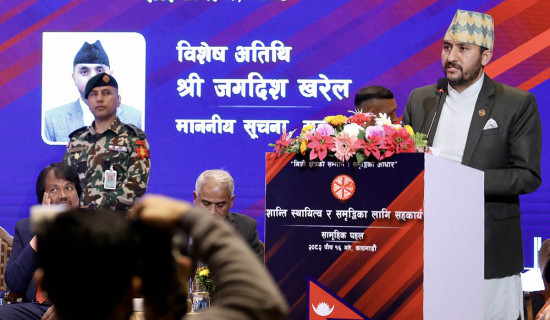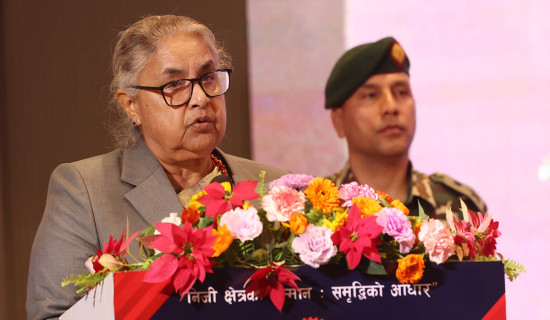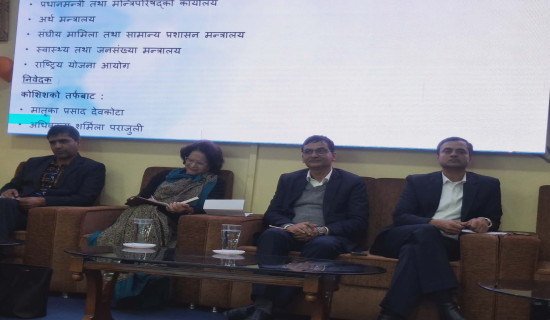- Thursday, 1 January 2026
Role Of Women In Corruption Control
Ramesh Dahal
Women fall on the first line of the population to potentially suffer more from the consequences of corruption. Therefore, they need to play a catalytic role in controlling corruption and generating awareness against the abuse of power. Corruption has many forms, and deprives people of goods and services catered by the public offices.
The Commission for the Investigation of Abuse of Authority states that several modes of corruption exist in Nepal, and sadly, it is rearing its tentacles here and there. The intensity, process, methods, volume, and actors abusing power are dissimilar but exist almost everywhere at all levels of public and private institutions, though efforts have been made to control them for a long time.
One has to understand that the socially created private property in our patriarchal society is a main factor behind the rising cases of corruption. Second, the transitional politics provides a fertile ground for many to get indulged in unethical activities. Third, the ‘state of impunity" is also encouraging the people to get involved in economic malfeasance.
Furthermore, research undertaken by scholars Eugen Dimant and Guglielmo Tasato discloses that corruption leads to political instability, together with a low level of the democratic process and weak people’s participation in decision-making, being a cause of abuse of power-by-power holders. Likewise, gender inequality in a state of high-level poverty and the presence of extravagant families are another reason why actors feel no hesitation in abusing power. Similarly, high levels of unemployment and a lack of government assurance for education and health gives room for corruption.
Lack of stringent law
On top of that, the lack of stringent law against corruption has given rise to the economic irregularities. Sadly, the above-mentioned factors exist in Nepal; hence, power holders, without fear, get engaged in abuse of authority that seriously affect the country’s image.
In Transparency International’s corruption perception ranking, Nepal ranked 117th in the global ranking in 2021. While it scored 34 in 2022 compared to 33 in 2021 (score 0 refers to the most corrupted country, while score 100 refers to the cleanest one).
The score below 50 refers to countries with higher levels of corruption, while countries with a score above 50 are taken as having lower levels of corruption. Based on this score, Transparency International concludes that Nepal is a country of high-level corruption.
Here, this scribe dwells on how women are victimised by corruption, and then how they women play a role in increasing corruption. At the same time, this article also sheds light on how women can work as catalytic force in spearheading anti-corruption crusade. Corruption affects men and women differently.
Women suffer more due to gender disparity arising from social, economic, cultural, and environmental factors. Disempowerment as a result of gender disparity makes women vulnerable to corruption.
Socially and economically marginalised groups are discriminated, so women are more vulnerable. Men have more access to information than women, and their voices are taken more seriously.
Men have better access to education and leadership, but the same opportunities are not available for many women. In many communities, women are not allowed to speak or take part in public debates. The corruption is more acute due to their limited access to social, political, and economic opportunity and their attempt to break the chain is weak.
In an emergency, the chances of women being sexually victimised are high as a consequence of corruption because they are forced or tempted to offer sex in exchange of money or favour to secure post or opportunity. So, less empowered women are coerced to meet sexual demands by power holders as they are unable to pay bribes for administrative services and social security.
In addition, women are more vulnerable during emergencies as they lose their resilience. Loss of faith among people around them and the collapse of infrastructure and security systems undermine their resilience.
For example, women are forced for physical relations for livelihood and security of family members during armed conflict. Due to a lack of property, women cannot pay bribes for health, education, and other services. Likewise, women are vulnerable to being raped or sexually abused when they do not have reliable social protection.
Women in the deprived community have to face multiple challenges as a result of corruption. They need to depend on the administration to be protected from domestic violence, but their voices remain unheard as a result of male power manipulation. Her social security provisions are paralysed, so she will not feel the presence of the rule of law.
Abusers may provoke them to pay bribes to get services, or they may need to face the hassles. In exceptional cases, women cannot react and also cannot supply the bribe, which necessitates their accepting the sex appeal.
Talking about some research on women’s tendency to be affiliated with corruption, scholars like Alatas and Friends, Jha and Sarangi, and others believe that women are less likely to engage in corruption compared to men. Some scholars believe that female voters punish their corrupt leaders more promptly compared to male voters.
A study undertaken by the Westminster Foundation for Democracy (WFD) suggests that women are honest, so they are less likely to engage in corruption. However, the role of empowered women in corruption cannot be undermined.
If empowered women get the opportunity to have money from a parallel economy, they do not miss doing it. For example, cases of active involvement of Nepali-empowered women are apparently seen in corruption.
The rising corruption in Nepali society can be fought by changing women’s perception about the need to have expensive ornaments, land, bungalows, cars, and bank balances. The competition of women for expensive jewellery and clothes impels their hubbies to accept kickbacks to meet the insatiable need of their better halves. This sort of corrupt practice is more prevalent among women from urban areas compared to rural areas.
Barring some exceptions, most Nepali women do not have their own sources of income. The participation of such unemployed women in social activities like wedding ceremonies, teej festivals, and gatherings is intense.
Women love to use these forums as an opportunity to show off their gold ornaments and expensive attire. The demands of a wife and her attraction towards money provoke a man to take part in corruption.
Corruption-free lifestyle
Nepali women might become corrupt in their households and workplaces. Teaching children while nurturing them to adopt a corruption-free lifestyle will be the very beginning, but the long-term strategy to develop a corruption-free society is important because the culture learned from mothers at an early age will have a lifelong impact.
Couples are familiar with their spouse’s potential inclination towards minor to structural corruption, and this is a good opportunity for them to sensitise each other for a corruption-free professional life. If the wife disagrees with her husband for accepting bribe, the latter is discouraged from indulging in such misdeed.
Women need to understand that if anyone abuses power, it directly hit them. The gender movement for equality gets weakened when corruption distorts the objectives of sustainable development, democratic governance, and gender equality.
The majority of women from socially, economically, and geographically discriminated groups hardly get access to the policymaking level. Therefore, women ought to take the anti-corruption crusade together with gender issues.
(Dahal writes on development issues.)
How did you feel after reading this news?













-original-thumb.jpg)


